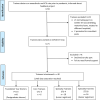Trainee doctors' experiences of learning and well-being while working in intensive care during the COVID-19 pandemic: a qualitative study using appreciative inquiry
- PMID: 34035110
- PMCID: PMC8154293
- DOI: 10.1136/bmjopen-2021-049437
Trainee doctors' experiences of learning and well-being while working in intensive care during the COVID-19 pandemic: a qualitative study using appreciative inquiry
Abstract
Objectives: Concern about trainee work-related well-being has been raised in recent years and is the subject of several reviews, reports and research studies. This study aimed to understand the experiences of trainees working in a large intensive care unit during the first surge of the COVID-19 pandemic from an educational and operational perspective in order to highlight what worked and what could be improved.
Design: A qualitative study using peer-to-peer semistructured interviews, developed using appreciative inquiry methodology, was conducted during July 2020. Responses were analysed using a thematic analysis technique.
Setting: A large, tertiary intensive care unit in the UK.
Participants: All trainees in anaesthesia and intensive care working on the intensive care unit during the first surge were invited to participate.
Results: Forty interviews were conducted and four over-arching themes were identified. These were: feeling safe and supported; physical demands; the emotional burden of caring; and a sense of fulfilment, value and personal development. Positive aspects of the organisational response to the pandemic included communication, personal protective equipment supply, team working and well-being support. Suggestions for improvement focused on rest facilities, rota patterns and hierarchies, creating opportunities for reflection and ensuring continued educational and training opportunities despite operational demands.
Conclusions: Trainees described opportunities for learning and fulfilment, as well as challenges, in working through a pandemic. Trainees described their needs and how well these were met during the pandemic. Ideas for improvement most frequently related to basic needs including safety and fatigue, but suggestions also related to supporting learning and development. The appreciative inquiry methodology of the project facilitated effective reflection on positive aspects of trainee experiences.
Keywords: COVID-19; adult anaesthesia; adult intensive & critical care; education & training (see medical education & training).
© Author(s) (or their employer(s)) 2021. Re-use permitted under CC BY-NC. No commercial re-use. See rights and permissions. Published by BMJ.
Conflict of interest statement
Competing interests: None declared.
Figures



Similar articles
-
Critical care work during COVID-19: a qualitative study of staff experiences in the UK.BMJ Open. 2021 May 18;11(5):e048124. doi: 10.1136/bmjopen-2020-048124. BMJ Open. 2021. PMID: 34006556 Free PMC article.
-
Exploring the impact of the COVID-19 pandemic on doctors' core workplace needs: a qualitative study of internal medicine trainees in Scotland.BMJ Open. 2021 Jun 30;11(6):e053506. doi: 10.1136/bmjopen-2021-053506. BMJ Open. 2021. PMID: 34193507 Free PMC article.
-
Learning lessons from the paediatric critical care response to the SARS-CoV-2 pandemic in England and Wales: a qualitative study.Arch Dis Child. 2022 Mar;107(3):e6. doi: 10.1136/archdischild-2020-320662. Epub 2021 Aug 20. Arch Dis Child. 2022. PMID: 34417188
-
Impact of the COVID-19 pandemic on anaesthesia trainees and their training.Br J Anaesth. 2020 Oct;125(4):450-455. doi: 10.1016/j.bja.2020.07.011. Epub 2020 Jul 23. Br J Anaesth. 2020. PMID: 32773215 Free PMC article. Review.
-
UK internal medicine training in the time of COVID-19.J R Coll Physicians Edinb. 2021 Jun;51(2):177-183. doi: 10.4997/JRCPE.2021.220. J R Coll Physicians Edinb. 2021. PMID: 34131681 Review.
Cited by
-
Factors affecting UK anaesthetic trainees' wellbeing and stress: a scoping review.Anaesthesia. 2025 Feb;80(2):151-160. doi: 10.1111/anae.16410. Epub 2024 Sep 10. Anaesthesia. 2025. PMID: 39255327 Free PMC article.
-
In their own words: Experiences of emergency health care workers during the COVID-19 pandemic.Acad Emerg Med. 2022 Aug;29(8):974-986. doi: 10.1111/acem.14490. Epub 2022 May 22. Acad Emerg Med. 2022. PMID: 35332615 Free PMC article.
-
Health and Social Care Professionals' Experience of Psychological Safety Within Their Occupational Setting: A Thematic Synthesis Review.Nurs Rep. 2025 Apr 14;15(4):131. doi: 10.3390/nursrep15040131. Nurs Rep. 2025. PMID: 40333056 Free PMC article. Review.
-
Qualitative study to explore UK medical students' and junior doctors' experiences of occupational stress and mental health during the COVID-19 pandemic.BMJ Open. 2022 Dec 12;12(12):e065639. doi: 10.1136/bmjopen-2022-065639. BMJ Open. 2022. PMID: 36523252 Free PMC article.
-
'Thrown in at the deep end': a qualitative analysis into the transition from trainee to consultant during the COVID-19 pandemic and lessons for the future.BJA Open. 2023 Jun 26;7:100217. doi: 10.1016/j.bjao.2023.100217. eCollection 2023 Sep. BJA Open. 2023. PMID: 37638089 Free PMC article.
References
-
- ICM & Anaesthesia – Covid19 . Information, guidance and resources supporting the understanding and management of coronavirus (COVID-19). Available: https://icmanaesthesiacovid-19.org/cross-skill-training-for-pandemic-cov... [Accessed 15 Dec 2020].
-
- NHS England . Clinical guide for anaesthesia service reorganisation during the coronavirus pandemic. Available: https://www.england.nhs.uk/coronavirus/wp-content/uploads/sites/52/2020/... [Accessed 5 Dec 2020].
-
- Torlinski T, Kaur Mullhi R, Parekh D, et al. . Postgraduate education and specialty training in anaesthesia and intensive care medicine during the COVID-19 pandemic: experience from a large teaching hospital in the United Kingdom. Anaesthesiol Intensive Ther 2020;52:434–7. 10.5114/ait.2020.101360 - DOI - PMC - PubMed
MeSH terms
LinkOut - more resources
Full Text Sources
Other Literature Sources
Medical
Miscellaneous
